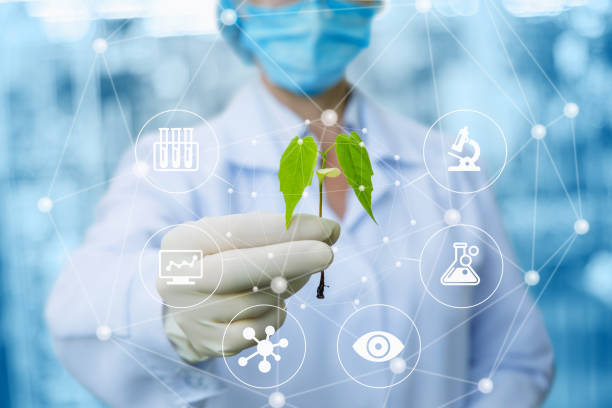Introduction:
Agriculture has always been a vital industry that provides food, fuel, and fiber to the world. With a growing global population, the demand for food and other agricultural products is increasing. In recent years, biotechnology has emerged as a powerful tool to address the challenges facing agriculture, from improving crop yields to reducing the use of harmful pesticides. In this article, we will explore how biotechnology is revolutionizing agriculture, and what impact this is having on the industry.
What is Biotechnology?
Definition
Biotechnology is the use of biological processes and systems to develop new technologies and products. It includes a wide range of techniques, from genetic engineering to bioprocessing, that is used to produce new products or improve existing ones.
Applications in Agriculture
In agriculture, biotechnology is used to improve crop yields, reduce the use of harmful pesticides, and enhance the resistance of crops to diseases and pests. These improvements can lead to increased food production, reduced costs, and improved food safety.
How is Biotechnology Revolutionizing Agriculture?
Improving Crop Yields
One of the main ways that biotechnology is revolutionizing agriculture is by improving crop yields. This is achieved through genetic engineering, where the genes of crops are modified to enhance desirable traits, such as increased resistance to diseases and pests, improved nutritional content, and increased yields.
Reducing the Use of Pesticides
Another way that biotechnology is revolutionizing agriculture is by reducing the use of harmful pesticides. This is achieved through the development of crops that are resistant to pests and diseases, reducing the need for chemicals to be applied to the crops. This leads to a reduction in the use of harmful chemicals, which can be harmful to the environment and human health.
Improving Food Safety
Biotechnology can also be used to improve food safety by reducing the risk of foodborne illnesses. This is achieved through the development of crops that are resistant to harmful bacteria, such as E. coli and salmonella, and through the use of bioprocessing techniques that can eliminate harmful pathogens in food products.
Enhancing Nutritional Content
Another way that biotechnology is revolutionizing agriculture is by enhancing the nutritional content of crops. This is achieved through the genetic modification of crops to increase the levels of important vitamins and minerals, such as iron and vitamin A. This can lead to improved health and nutrition for people who consume these crops, especially in developing countries where malnutrition is a major problem.
Increasing Sustainable Agriculture
Biotechnology can also be used to promote sustainable agriculture, which is an important goal for the industry. This is achieved through the development of crops that are more resistant to drought and other environmental stressors, as well as through the use of bioprocessing techniques that reduce waste and conserve resources.
Conclusion:
Biotechnology is a powerful tool that is revolutionizing agriculture in many ways, from improving crop yields to reducing the use of harmful pesticides. The benefits of biotechnology are significant, and it is likely that this technology will continue to play an important role in the development of the agriculture industry in the years to come. Whether you are a farmer, a food producer, or simply someone who is interested in the future of food, it is worth exploring how biotechnology is transforming the industry and what impact it is having on the world.

